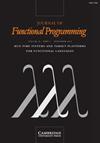Tight typings and split bounds, fully developed
IF 1.1
3区 计算机科学
Q4 COMPUTER SCIENCE, SOFTWARE ENGINEERING
引用次数: 17
Abstract
Abstract Multi types – aka non-idempotent intersection types – have been used. to obtain quantitative bounds on higher-order programs, as pioneered by de Carvalho. Notably, they bound at the same time the number of evaluation steps and the size of the result. Recent results show that the number of steps can be taken as a reasonable time complexity measure. At the same time, however, these results suggest that multi types provide quite lax complexity bounds, because the size of the result can be exponentially bigger than the number of steps. Starting from this observation, we refine and generalise a technique introduced by Bernadet and Graham-Lengrand to provide exact bounds. Our typing judgements carry counters, one measuring evaluation lengths and the other measuring result sizes. In order to emphasise the modularity of the approach, we provide exact bounds for four evaluation strategies, both in the λ-calculus (head, leftmost-outermost, and maximal evaluation) and in the linear substitution calculus (linear head evaluation). Our work aims at both capturing the results in the literature and extending them with new outcomes. Concerning the literature, it unifies de Carvalho and Bernadet & Graham-Lengrand via a uniform technique and a complexity-based perspective. The two main novelties are exact split bounds for the leftmost strategy – the only known strategy that evaluates terms to full normal forms and provides a reasonable complexity measure – and the observation that the computing device hidden behind multi types is the notion of substitution at a distance, as implemented by the linear substitution calculus.打字紧凑,分界线,充分发展
摘要多类型——也就是非幂等交集类型——已经被使用。以获得高阶程序的定量边界,如de Carvalho所开创的。值得注意的是,它们同时绑定了评估步骤的数量和结果的大小。最近的结果表明,步骤的数量可以作为一个合理的时间复杂性度量。然而,同时,这些结果表明,多类型提供了相当宽松的复杂性边界,因为结果的大小可能比步骤的数量大指数。从这一观察开始,我们完善并推广了Bernadet和Graham Lengrand引入的一种技术,以提供精确的边界。我们的打字判断带有计数器,一个测量评估长度,另一个测量结果大小。为了强调该方法的模块性,我们提供了四种评估策略的精确边界,包括λ-演算(头部、最左边的最外面和最大评估)和线性替换演算(线性头部评估)。我们的工作旨在捕捉文献中的结果,并以新的结果扩展它们。在文学方面,它通过统一的技巧和基于复杂性的视角,将德卡瓦略、贝尔纳多特和格雷厄姆·伦格兰德统一起来。两个主要的新颖之处是最左边策略的精确分割边界——这是唯一已知的将项评估为完全正规形式并提供合理复杂度度量的策略——以及隐藏在多类型后面的计算设备是线性替换演算实现的远距离替换的概念。
本文章由计算机程序翻译,如有差异,请以英文原文为准。
求助全文
约1分钟内获得全文
求助全文
来源期刊

Journal of Functional Programming
工程技术-计算机:软件工程
CiteScore
1.70
自引率
0.00%
发文量
9
审稿时长
>12 weeks
期刊介绍:
Journal of Functional Programming is the only journal devoted solely to the design, implementation, and application of functional programming languages, spanning the range from mathematical theory to industrial practice. Topics covered include functional languages and extensions, implementation techniques, reasoning and proof, program transformation and synthesis, type systems, type theory, language-based security, memory management, parallelism and applications. The journal is of interest to computer scientists, software engineers, programming language researchers and mathematicians interested in the logical foundations of programming.
 求助内容:
求助内容: 应助结果提醒方式:
应助结果提醒方式:


